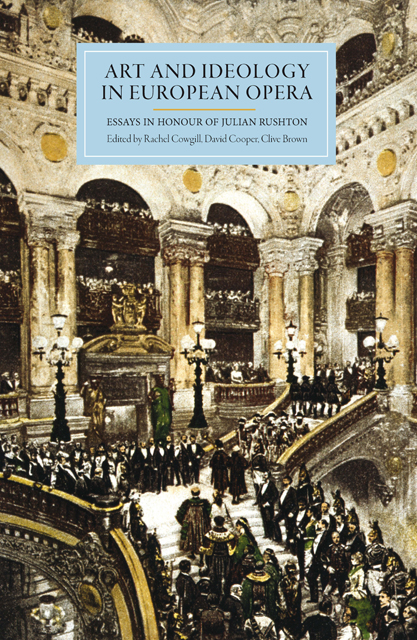Book contents
- Frontmatter
- Contents
- List of Figures
- List of Music Examples
- List of Tables
- Notes on Editors and Contributors
- Acknowledgements
- Introduction
- I Nationalism, Cosmopolitanism and National Opera
- II Opera, Class and the Politics of Enlightenment
- III Opera and Otherness
- Julian Rushton: A Family Memoir
- 7 The Works of Julian Rushton
- Index
- Tabula Gratulatoria
2 - Mendelssohn’s Die Hochzeit des Camacho: An Unfulfilled Vision for German Opera
Published online by Cambridge University Press: 28 February 2023
- Frontmatter
- Contents
- List of Figures
- List of Music Examples
- List of Tables
- Notes on Editors and Contributors
- Acknowledgements
- Introduction
- I Nationalism, Cosmopolitanism and National Opera
- II Opera, Class and the Politics of Enlightenment
- III Opera and Otherness
- Julian Rushton: A Family Memoir
- 7 The Works of Julian Rushton
- Index
- Tabula Gratulatoria
Summary
Few nineteenth-century musicians were as ideologically motivated in their artistic careers as Mendelssohn, although paradoxically he was notably reluctant to expound or discuss his aims and objectives. Comments on artistic matters in his letters, however, leave no doubt about the profound seriousness with which he engaged in all his musical activities. Towards theatrical music his attitude was ambivalent. On the one hand, he undoubtedly recognized that it was the arena in which a composer could most easily establish a reputation, and that the future of German opera was a burning issue; he will certainly have been aware of Spohr's exhortation in his ‘Aufruf an deutsche Componisten’ [Appeal to German composers], published in the Allgemeine musikalische Zeitung in 1823:
[A composer] may provide the most excellent things for the church and concert hall and he will still be known only to a small portion of the public; but if he gains success in the theatre, his name is soon on everyone's lips. Therefore stir yourselves! let us act, German composers; the moment has arrived when our efforts can be crowned with success!
On the other hand, opera presented composers with potentially challenging conflicts between artistic refinement and the unsophisticated or fickle taste of the opera-going public, which were particularly problematic for a composer as fastidious as Mendelssohn. The reasons why he never went before the public with another opera after the abortive production of Camacho in 1827 are intimately bound up with his failure to resolve these tensions. During the last twenty years of his life the idea of writing an opera was never far from his mind; yet despite various commissions, beginning with one from Munich in 1831, it was not until 1847 that he made significant progress, with a setting of Geibel's Die Lorelei that remained unfinished at his death. Mendelssohn's equivocal attitude towards opera during his maturity is expressed in a letter, written from Paris in 1831.
- Type
- Chapter
- Information
- Art and Ideology in European OperaEssays in Honour of Julian Rushton, pp. 40 - 66Publisher: Boydell & BrewerPrint publication year: 2010



